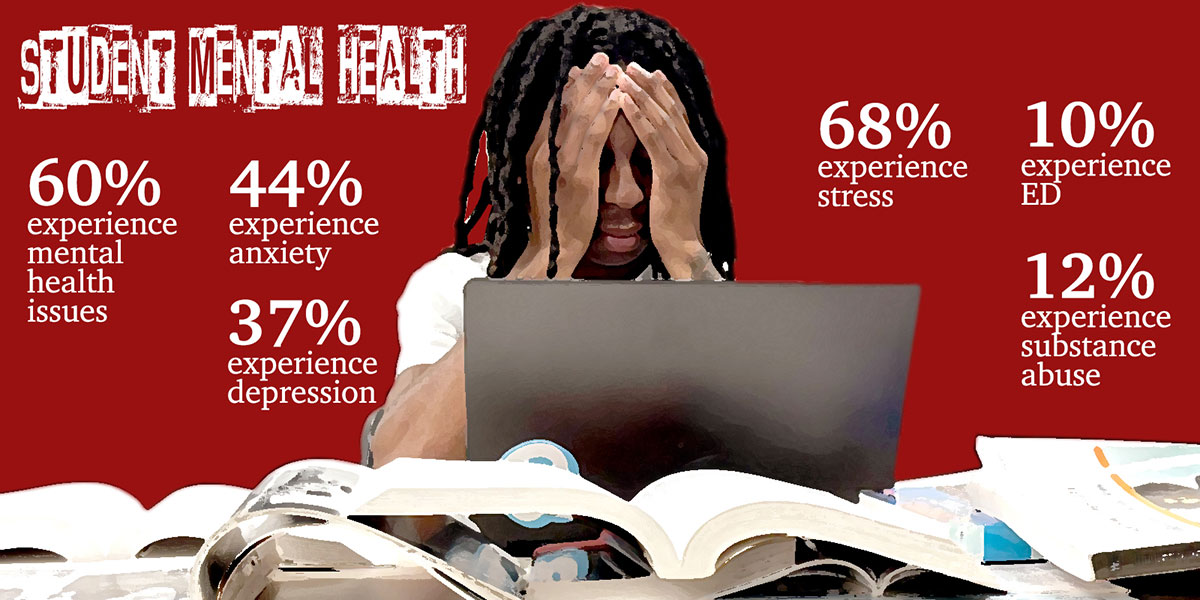Counselors create safe space for students seeking help

Approximately 1,100 college-aged students a year lose their life to suicide due to mental health struggles.
Whether it be depression, anxiety, relationship issues, homesickness or suicidal thoughts, the Student Health Center counselors are ready to support students.
“You’re not alone,” Kierra Bridgewater, assistant director of counseling services, said. “Suicide ideation can feel isolating. It’s something that a lot of people aren’t struggling with, and so it makes it weird.
“It’s hard for them to speak up, but once they do, I think they would be surprised at how many people are having passive suicide ideation. That’s like saying, ‘If I didn’t wake up tomorrow, I’d be OK with it.’ ‘I’m so stressed, I just can’t do it anymore.’”
Bridgewater said that while many believe that suicide is an active, physical action, sometimes signs of suicide start as passive thoughts.
Recognizing early signs of mental health struggles can save a student’s life.
“Oftentimes, students will begin to verbalize certain words,” Cynthia Ksiazek, Student Health Center counselor, said. “Students will say things like, ‘Oh, what’s the use,’ when they’re writing an essay — they express passive or suicidal thoughts.”
When a friend hears another friend mention ending their life, whether it be seriously or passively, that friend should take heed and say, “let’s go on over to the Student Health Center,” Ksiazek said.
Bridgewater said she teaches people that suicide is not anything to joke about, because sometimes people really mean it.
“It’s truth masked in humor,” she said.
Students will also walk their peers over to the SHC when they notice a change in behavior, Ksiazek said.
“Their body language may appear sad, and they are not smiling as much as they used to,” Ksiazek said. “They’re withdrawn and not showing up to class, or if they do come in, maybe they’re asleep or they’re just not paying attention. They’re just not fully present. Their minds seem somewhere else.”
SHC counselors will also sometimes refer students for outside help, Ksiazek said.
“Depending on the rotation, we will refer them to the local emergency room and then a cop will do a full evaluation for that student to determine if they need inpatient care or further care from there,” she said.
Bridgewater said SHC staff can also assist students in getting accommodations at LU’s Accessibility Resource Center.
“Even if we don’t have the specific resource they need here, they still see us and we can refer them out so they can receive the help they need,” she said.
Long term initiatives are also being implemented for the counselors to ensure students receive the best care, Bridgewater said.
“Right now, we are doing a quality study to improve our retention rate in counseling,” Bridgewater said. “That is for new students that come in for their initial appointment to make sure they return for their second appointment.
“Two out of four counselors are also trained in EMDR, which is eye movement desensitization in reprocessing. It’s a trauma-focused counseling, and we’re all getting trained in that.”
Even when the counselors are unavailable, there is a system set up to provide on-the-spot care for students.
“We do something called a triage,” Ksiazek said. “It’s where we’re available at that very moment to speak with them, and that’s ongoing.”
Counseling appointments may be scheduled online, and students can expect an appointment within a week, Ksiazek said. Walk-in appointments are also available.
For more information or to schedule an appointment, visit lamar.edu/students/student-affairs/student-health-center, or call 409-880-8466.
For help with suicidal thoughts, call or text the suicide hotline at 988.
